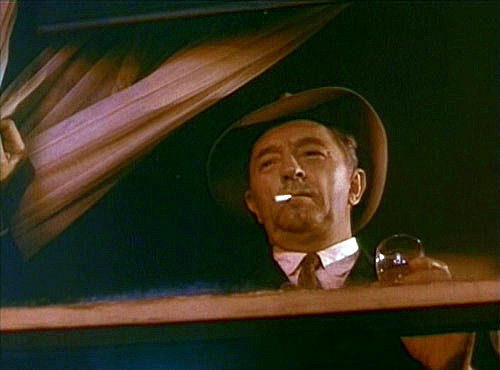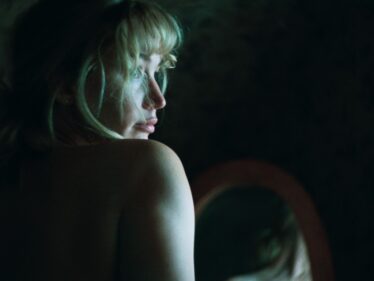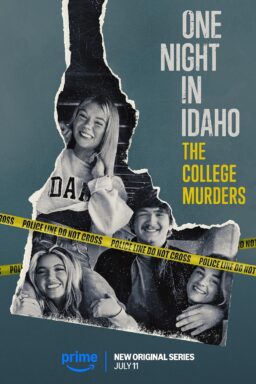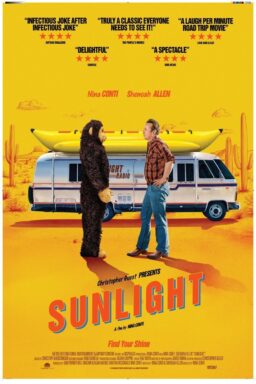HOLLYWOOD – Robert Mitchum is wearing this…tie. It features bold horizontal stripes of green and glittering gold. “Look at the damn thing, will ya?” he says. It is like no tie anyone has ever seen before, and the tag on its back says Space Delicious.
“I picked it up in Japan,” Mitchum explains, “and I thought I’d wear it today because I’m going to the track, and with a tie like this, I might be able to hustle up a little action. I think I got the name figured out. They got out their English-Japanese dictionary and got a little too literal, and what Space Delicious means is…wide.”
He lights a Pall Mall and sinks into a leather couch in his office on Sunset Strip. He has just finished playing Philip Marlowe, the legendary Raymond Chandler private eye, in “Farewell, My Lovely.” Before that, he quit, or was fired from, Otto Preminger‘s “Rosebud,” a film he now says Otto could have benefited from his advice on. Before that, he played a weary World War II veteran plunged into the Japanese underworld in “The Yakuza.” And before that, in a marvelously realized performance, he was a stubborn Mafia small-fry in “The Friends of Eddie Coyle.”
He is, says Warren Beatty, the finest movie actor of his generation. And at 57, Mitchum is very much in demand, having somehow grown into the weariness of his cautiously hooded eyes so that nobody is better at playing cynical but undefeated middle-aged men. And it may be that, after Dick Powell, Humphrey Bogart, Robert Montgomery, James Garner and, yes, Elliott Gould, we will discover after all that Robert Mitchum is the actor born to play Philip Marlowe.
“They were gonna make ‘Farewell, My Lovely’ last year,” Mitchum said. “They wanted Richard Burton. He was doing something else. The producer, Elliott Kastner, comes by with Sir Lew Grade, the British tycoon. He has a black suit, a black tie, a white shirt and a whiter face. ‘I know nothing about motion pictures,’ Sir Lew says. ‘What I know is entertainment: Ferris wheels, pony rides.’ I suggested we buy up the rights to ‘Murder, My Sweet’ with Dick Powell, re-release it and go to the beach.
“But, no, they hired a director, Dick Richards, so nervous he can’t hold his legs still. They have all the hide rubbed off them, He started doing TV commercials. He was accustomed to, you know, start the camera, expose 120 feet of film and tell somebody to move the beer bottle half an inch clockwise. He does the same thing with people.”
Mitchum inhaled, exhaled slowly, leaned forward to see into his outer office. “Bring me a Miltown, sweetheart,” he said to his secretary. “Christ, I can’t keep up during this mad, merry social season. Comes the rites of spring, there’s nothing but elections, premieres…Why they continue to send all these invitations to me is…Thanks, sweetheart….
“So, as I was saying, we had one great find on this picture. At least, he’s a find if we can ever find him again. His name is Jack O'Halloran. He plays a big, tough guy named Moose. ‘Jeez,’ he says, ‘I hope this don’t make me a star, ’cause I don’t pay no taxes. I sent the government my death certificate.’ “
Mitchum laughed and shook his head in wonderment at O’Halloran.
“He used to play ball with the Philadelphia Eagles.
Then he was a fighter. He developed this disease that promoted his bone growth to make him look like Primus Erectus. They bolted his head down and blasted his pituitary gland with a laser beam, and two months later, he was back in the ring.
“They hired him for $500 a week. He looked perfect for the part. One time he hit the producer. One of the producers. We had seven of them. We called them the Magnificent Seven. Jack was swinging this poor bastard around his head like an Indian war club. I tried to explain to him: ‘The guy can be talked to, Jack.’ He shakes his head. ‘Mitch,’ he says, ‘I was crying too hard.'”
Mitchum smiles again. An interview with him is always a series of these anecdotes, stories drawn seemingly at random from a life in which Mitchum inhabits dead center, amused and amazed by the bizarre menagerie of characters surrounding him.
“The girl on the picture,” he said, “was Charlotte Rampling. She was the chick who dug S-and-M in ‘The Night Porter.’ She arrived with an odd entourage, two husbands or something. Or they were friends and she married one of them and he grew a mustache and butched up. She kept exercising her mouth like she was trying to swallow her ear.
“I played her on the right side because she had two great big blackheads on her left ear, and I was afraid they’d spring out and lodge on my lip. There were no tea breaks on THAT set.”
Will the movie be any good? I asked.
“Oh yeah,” Mitchum said. “This kid Richards, the director, he’s got something. It’ll be a good picture.” Pause. “Of course, it doesn’t make too much sense. When they were making ‘The Big Sleep,’ you know, the writers called up Raymond Chandler and said they’d read his book carefully and at the end, there was one body left over. ‘Don’t bother ME with the body,’ Chandler tells them. ‘I certainly don’t know what the hell the book is about.’ Chandler was down at Laguna Beach then. I met him a couple times. ‘Why do they bother me?’ he says. ‘You sell the book and you’re STILL not finished with the thing.’ “
It was a lucky chance that got Mitchum into “Farewell, My Lovely” in the first place. He was on Corsica to play the lead in Preminger’s “Rosebud” when, in a celebrated but still somewhat unclear incident, he was fired, or quit, and came back to Hollywood just as the Marlowe role opened up.
“I might have been able to give Otto some advice on that picture,” Mitchum mused. “I was out there at 5:30 one morning, looking at the raw eggs they were describing as breakfast and doing my Otto Preminger imitation, and Otto comes up behind me and starts bellowing.”
The exchange, as Mitchum remembers it, went like this:
Preminger: “You have been drinking with the Corsicans!”
Mitchum: “Who the hell else is there around here to drink with, Otto?”
Preminger: “By the end of the day, you are hopelessly drunk!”
Mitchum: “It’s the end of the day, isn’t it?”
Preminger: “You are drunk now!”
Mitchum: “Now, Otto, how in hell can I be drunk at 5:30 in the morning?”
Preminger (blustering): “You are THROUGH!”
Mitchum: “Taxi!”
Remembering, Mitchum grinned. “Old Otto’s jaw dropped like he had a weight tied to it. He realized too late he had overacted one time too many.”
It was time, now, for Mitchum to head for the racetrack, and he strolled out of his office and toward the elevator. The magnificent Japanese tie reflected the corridor lights, and Mitchum examined it again.
“Making that picture in Japan was weird,” he said.
“The studio looked like something struck by a tornado. Most of us got staph infections breathing the dust. On the next sound stage, there were a bunch of women naked to the waist and covered with tattoos, making a female yakuza film.
“Now they want me to go back there and be in ‘The Battle of Midway.’ They have a lot of stock footage in Fujicolor. They wanted me to play Gen. Fletcher. Ten weeks’ work. Sorry, I said, I can’t spare the time.’ Then they have a role that’s five weeks long. That’s too long, too. Finally they call me up and offer me a role as Bull Halsey. ‘How long?’ I ask. One day, they say, and he’s in a hospital bed. ‘I can just about handle that,’ I said.”












